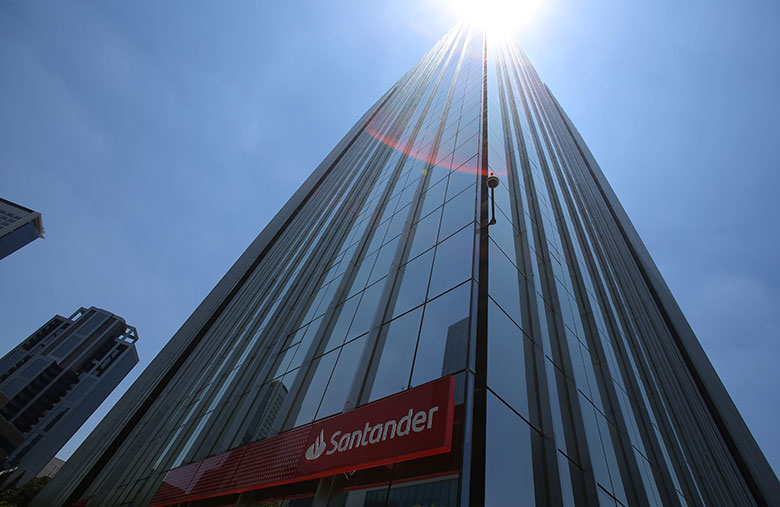A Santander office gleaming in the São Paulo sunshine
As the first of Brazil’s big banks to report first-quarter earnings, there was more focus than usual on Santander Brasil at the end of April as people searched for clues about the likely financial impact of the coronavirus.
The bank’s commentary on the results was always going to be more important than the results themselves as the coronavirus only began to impact Brazil’s economy in the last couple of weeks of the quarter.
While it reported a return on equity of 22.3% and an 11% increase in net profits, it was the lack of forward-looking action that perplexed analysts.
Facing an economy in crisis, the third-largest privately held bank in the country increased provisions at a lower rate than the increase in the total loan portfolio (19% and 20% respectively).
|
Angel Santodomingo, |
In fact, in his opening presentation to the earnings conference call, Angel Santodomingo, Santander Brasil’s chief financial officer, made two points in relation to the coronavirus that were positive: it was driving digital growth (greater efficiencies for the bank) and it had led to a “clear flight to quality movement, thus benefiting on balance funding instruments”.
The only negative assessment of the virus’s impact on the bank’s performance was remarkably mild.
“We think that credit quality will deteriorate in a limited way, but will deteriorate in the near future,” Santodomingo said.
Investors loved it: during that day’s session Santander share price was up 11.47%, dragging along other banks. Bradesco was up 8.77%, Banco do Brasil 13.43%, Itaú 8.25% and BTG Pactual 10.83%.
Together, the sector propelled the Ibovespa up 3.93%.
Questions
However, some of the questions belied a little incredulity.
Domingos Falavina, financial institutions analyst at JPMorgan – a bank that had recently announced a pre-emptive $8.3 billion increase in provisions to help it navigate a predicted recession – pointed out that the US saw four times more provisioning to cope with the coronavirus, while parent company, Santander Spain, had around €1.6 billion in provisions.
[What was] staggering to us was to see Santander Brasil provisioning as if no Covid-19 had taken place
– Domingos Falavina, JPMorgan
Santodomingo cited Santander’s relatively higher starting level of loan loss coverage, and said the bank wanted to see the levels of deterioration within the loan portfolios before it increased provisions.
Falavina later noted that what was “staggering to us was to see Santander Brasil provisioning as if no Covid-19 had taken place. Notably, provisions rose 19% year on year, less than loan expansion in the period and less than new nonperforming loan formation.”
Bradesco
Bradesco released its first-quarter results two days after Santander, on Thursday 30 April. It took a very different approach.
|
Octavio de |
Chief executive Octavio de Lazari said the bank modelled the coming impact on its loan book against two recent crises – the 2008 global crisis and the 2016 Brazilian recession – and the board had decided to allocate R$5.1 billion ($916 million) in provisions ahead of the coming quarters for “adverse economic scenarios”.
These provisions (an additional R$2.5 billion in the quarter) sent return on equity diving to 11.7% in the first quarter, down 880 basis points on an annual comparison and 950bp lower than the fourth quarter of 2019.
The bank was keen to stress it had been performing well leading into the crisis : for the first two months of 2020 the bank had grown its loan book by 14.4% (against guidance of 9% to 13%), net income interest by 11.7% (4% to 8%) and reduced operating expenses by 0.1% (0% to 4%).
The bank added to a sense that it was preparing to head into uncharted economic and financial waters by deciding to suspend all guidance.
Bradesco’s more prudent approach certainly took the wind out of investor’s sails: its shares fell by 7.72%, while Santander Brasil’s dipped 4.59%, Itaú by 3.76%, Banco do Brasil 3.59% and BTG Pactual declined 3.29% – dragging the Ibovespa down by 3.2%.
Itaú
|
Candido Bracher, |
On Tuesday May 5, Itaú reported its quarterly results. It too has taken a prudent approach and is increasing provisions by R$4.5 billion (up 150% year on year), causing net income to fall 43% on an annual basis (R$3.9 billion), while ROE slumped to 12.8% (23.64%), its lowest in more than 20 years.
Commenting on the results, chief executive Candido Bracher suggested there could be further provisioning in the coming quarters.
“The perspectives are not very optimistic – we have the contagion index [R] still close to 3, which suggests the peak is not too close, and so the lockdown could be extended. And the longer we have the lockdown the slower the recovery will be.”


 Signal2forex.com - Best Forex robots and signals
Signal2forex.com - Best Forex robots and signals




